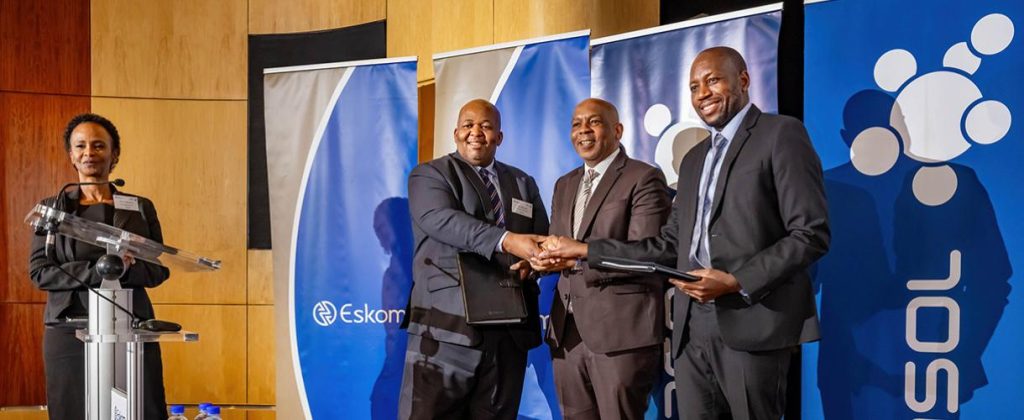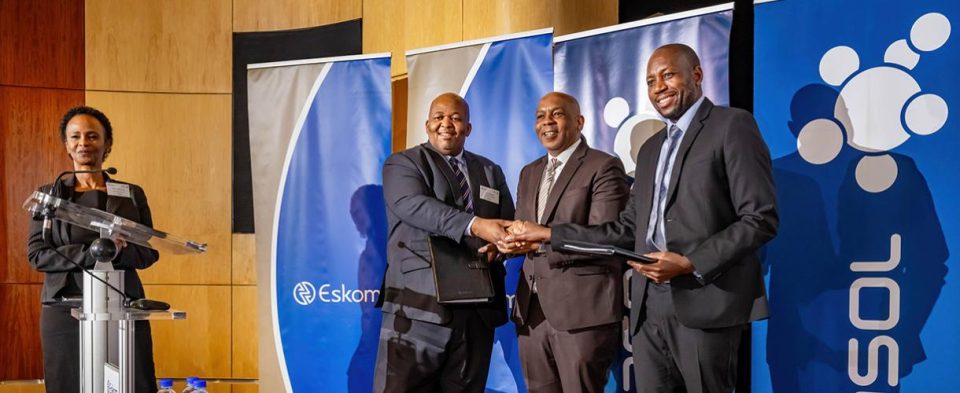
In a landmark move set to reshape South Africa’s energy landscape, Eskom and Sasol today signed a Memorandum of Understanding (MoU) to collaboratively explore and research potential future liquified natural gas (LNG) requirements. The collaboration will also enable the country to find a solution for gas users who require longer term certainty of supply beyond this decade.
The collaboration aims to determine the potential volumes that South Africa requires to establish a viable LNG import market along with the enabling infrastructure, and will be facilitated by government-to-government relations where necessary. This initiative focuses on using gas for power generation to provide essential base load electricity and position gas as a key enabler of re-industrialisation, while also ensuring continued supply to the market by unlocking global LNG resources. Furthermore, the collaboration will contribute to enhancing South Africa’s energy mix and enable the country’s energy transition and decarbonisation.
The MOU, under which Sasol and Eskom will collaborate to drive an intensive initial phase of research and planning, was signed with the full support of the Minister of Electricity and Energy, Dr Kgosientsho Ramokgopa, who delivered the keynote address at the signing ceremony.
“We have made it clear that we are serious about LNG solutions for the country, and that our demand for gas across both industrial and energy frontiers will unlock these solutions,” said Minister Ramokgopa. “This collaboration between our two energy champions – one public, one private – will provide a data-driven and commercially sound basis for gas-fed industrialisation and for us to explore the well-worn path to lower carbon energy that the global north has already taken by scaling gas to power. Gas has emerged as the second-largest contributor to global electricity production, experiencing rapid growth as many countries shift from coal to gas in their energy mix to enable positive implications for climate change, as gas typically emits less CO2 per unit of energy.“
Aligned to the Gas Master plan, the MoU will explore sourcing gas within South Africa, the Southern African Development Community (SADC) region, and other parts of the African continent, in addition to evaluating long-term LNG contracting. This will support the gas requirements for Eskom’s planned coal power station repowering and conversion to gas in the long term. The parties will also engage other state entities to enable an LNG value chain in South Africa.
As part of its revised gas strategy, Sasol is working on enabling the future supply of LNG to South Africa by collaborating with companies such as Eskom, existing and future customers, suppliers, and infrastructure developers.
The research findings from the first phase of the Sasol-Eskom collaboration will guide the necessary role players and investors required to offer the best prospects for South Africa’s energy market, while outlining the challenges associated with the long-term commitments required for LNG imports.
“As a leading energy player in South Africa, we are excited to collaborate with Eskom to transform the regional energy landscape. By leveraging our combined technical, operational and project execution expertise, we are
committed to enhancing regional energy security and driving development. In doing so, we will unlock new growth opportunities and help drive the transition to a more sustainable energy future for our country,” said Simon Baloyi, President and Chief Executive Officer, Sasol.
There is clear alignment between Sasol and Eskom in exploring LNG supply as an enabler of this vision.
“We have a great deal of experience as the two largest users of coal in South Africa,” said Dan Marokane, Group Chief Executive, Eskom, “and we felt by working together we could accelerate the climate change transition in a responsible way which sets the country up for the best economic, environmental and social outcomes and addresses the imminent gas supply shortfall. Eskom is focused on a balanced and diversified energy mix based on existing coal and nuclear and introducing gas for baseload power, as well as renewables, energy storage systems including batteries and pumped hydro, to achieve overall security of supply and to meet and exceed rapidly expanding energy demand,” he concluded
SOURCED FROM THE SASOL WEBSITE.


